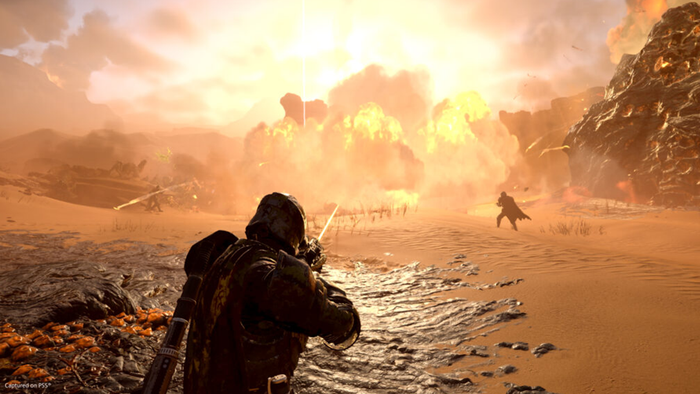Socializing with Games: Why Local Multiplayer is still important
Local multiplayer is a great way to socialize, maybe even the best there is in the realm of video games. Why do we sink so much time into online multiplayer with strangers when our friends are just down the street?

Earlier this month, my best friend of about 17 years moved to Colorado. As I'm still in Iowa, he's now far enough away that I'll need to arrange some significant travel plans and take time off work to visit him. Luckily, the internet makes it incredibly easy to stay in touch. Better yet, we can stay in touch while playing a seemingly unlimited library of online multiplayer games, with more popping up all the time.
You know what really breaks my heart, though? I probably won't be able to see the look on his face when I stomp him in Hawken.
As fantastic and varied as the world of online multiplayer has become, there's still one thing that holds me back from falling in love: isolation. Every moment that I spend playing online is a moment I'm not playing locally with the people I live nearby. Maybe I could justify that by telling myself, "Oh, you see your friends all the time...they're not going anywhere." But really, isn't it the online population that's not going anywhere? And even if they do physically move somewhere else, it's not like you'd even realize it unless they told you.
Seeing my friend move on to bigger and better things really drove this point home for me. He's not around anymore, so we can no longer play Towerfall together. We have a lifetime to play Call of Duty online, but we only had a precious few months to enjoy some of the best multiplayer experiences around and we probably didn't do that as much as we should have.
Now, this may seem like a criticism of local-only games like Towerfall, but it really isn't. This is a criticism of how the evolution of online multiplayer has made it seem like there's a one-button solution for social interaction. Towerfall is a brilliant game because it bolsters friendships between the people who need it the most: the people who have to deal with each other day in and day out. If I play with someone online, their role in my life is significantly less influential. If they call me a name, I mute them. If they cheat, I stop playing with them. Those aren't healthy ways of dealing with such behavior and being able to exhibit the antagonizing behavior without any real consequence is also unhealthy.
Games that include online multiplayer will always see these types of behaviors occur. Games that include local multiplayer in addition to the online multiplayer will probably not see very much local play (unless it's a title that established itself as a local multiplayer king before the rise of online play, such as Smash Bros or Mario Kart) because why would you go through all the hassle of calling your friends over when you could just play online? Considering both of these observations, it's no wonder that local multiplayer only titles are afraid to exist in the AAA space. Everything is so instant these days that it's hard to profit on something that requires the attention spans of multiple people to line up at the same time in the same place, not to mention the fact that sharing the experience with your friends means that those friends aren't likely to buy their own copies.
It's all about barriers. Hurdles to jump over. Even if it seems reasonable for you to find three friends whose schedules align and each have a controller (for the right system) to bring to the party, there are probably a thousand other people for which that is not the case. Those thousand people will prefer online play because the gratification is instant.
Not all hope is lost, though. Local multiplayer may never again be as profitable as online alternatives, but there are still ways we can help it thrive:
Accessibility. Making the game available for the widest audience possible will entice more players to pick it up, especially if they don't have access to "better" titles. This is something I strive for with my team, Virtually Competent. We focus primarily on making games that are free, playable on any HTML5 compatible device, and offer a variety of common control schemes (keyboard, touch, gamepad).
Word of mouth. Talking up your favorite titles (and inviting people to play with you) is especially valuable for local multiplayer because there's no way to gloss over the experience by playing for five minutes before moving on to the next game in their library of 500+ Steam titles. You can pique their curiosity and let it escalate until you finally organize a time to meet up and play, at which point it's become the centerpiece of the meeting and they can't help but be captivated by it (at least long enough to give it an honest shot). I've still yet to play J.S. Joust and I'm worried my heart may actually explode with anticipation before I finally get a chance to.
Make your own. Developing AI and/or netcode is hard. Developing a game where the player's interactions do most of the work is significantly less so. More people making more games is a good thing, made even better when they're games that people are really starving for. Even if you're not a programmer, there's a plethora of free tools to help you get started (Virtually Competent uses Construct 2).
Make something unique. Towerfall is brilliant because there's nothing quite like it, and there's nothing quite like it because so many people have written off local multiplayer as this obsolete thing that is no longer worth pursuing. Did you know there's still a dedicated community for writing interactive fiction? And many people who probably didn't even grow up with text adventures are making their own in Twine? Just as with local multiplayer, these types of games impose a number of limitations that force the developer to work creatively, which makes for a much more focused end product.
I love local multiplayer and I don't feel that way simply for nostalgic reasons. I think there's a lot of value in games that force players to socialize and a lot of that value seems to have been lost in translation during the move to online play. Playing together on the same couch can help friends settle their disputes in a safe space and help strangers find common ground, while online play (to me, at least) seems like it should be a last resort for socialization.
My friends won't always be around to play with me in person, so I should appreciate the time we can still spend together. Maybe you should, too.
Read more about:
BlogsAbout the Author(s)
You May Also Like













